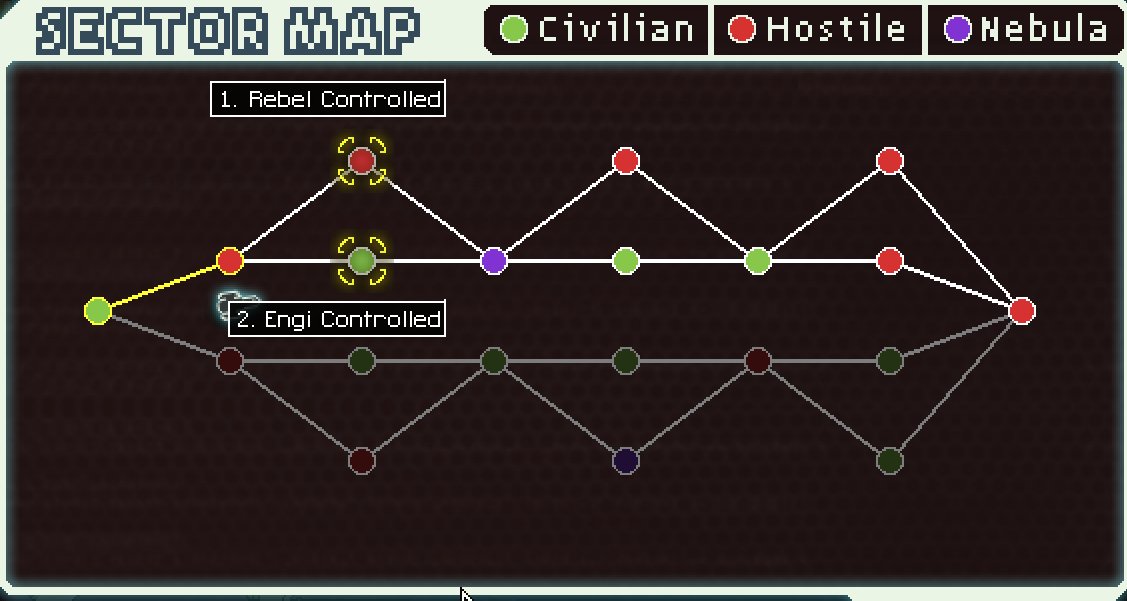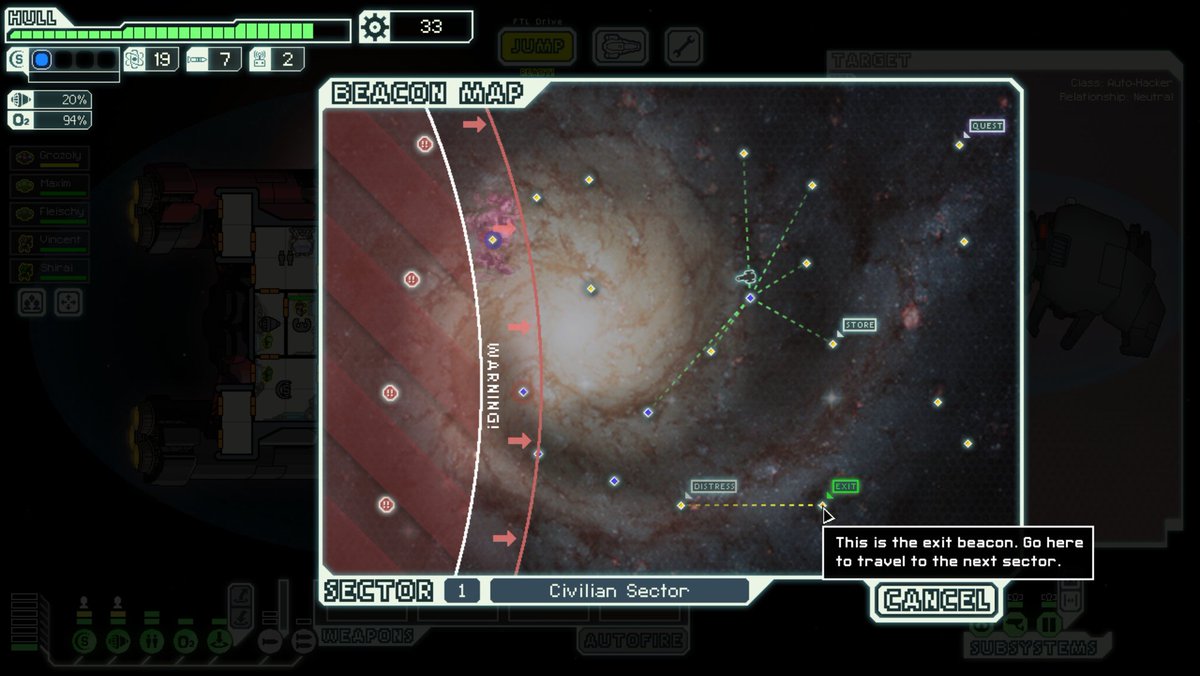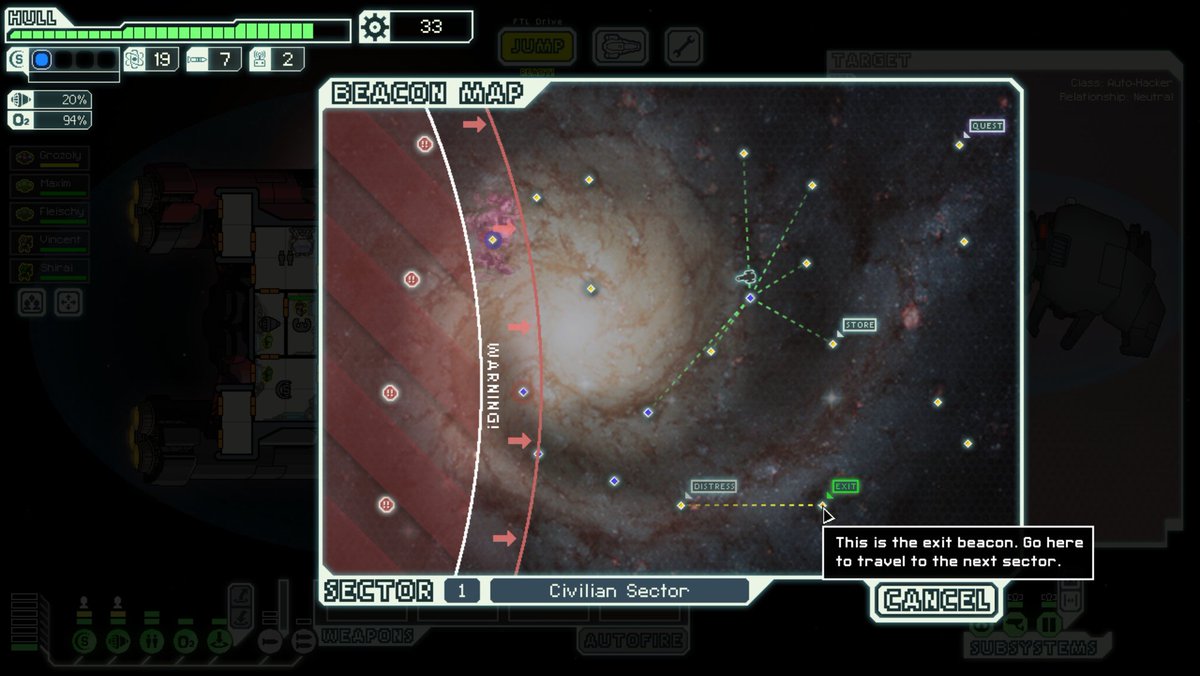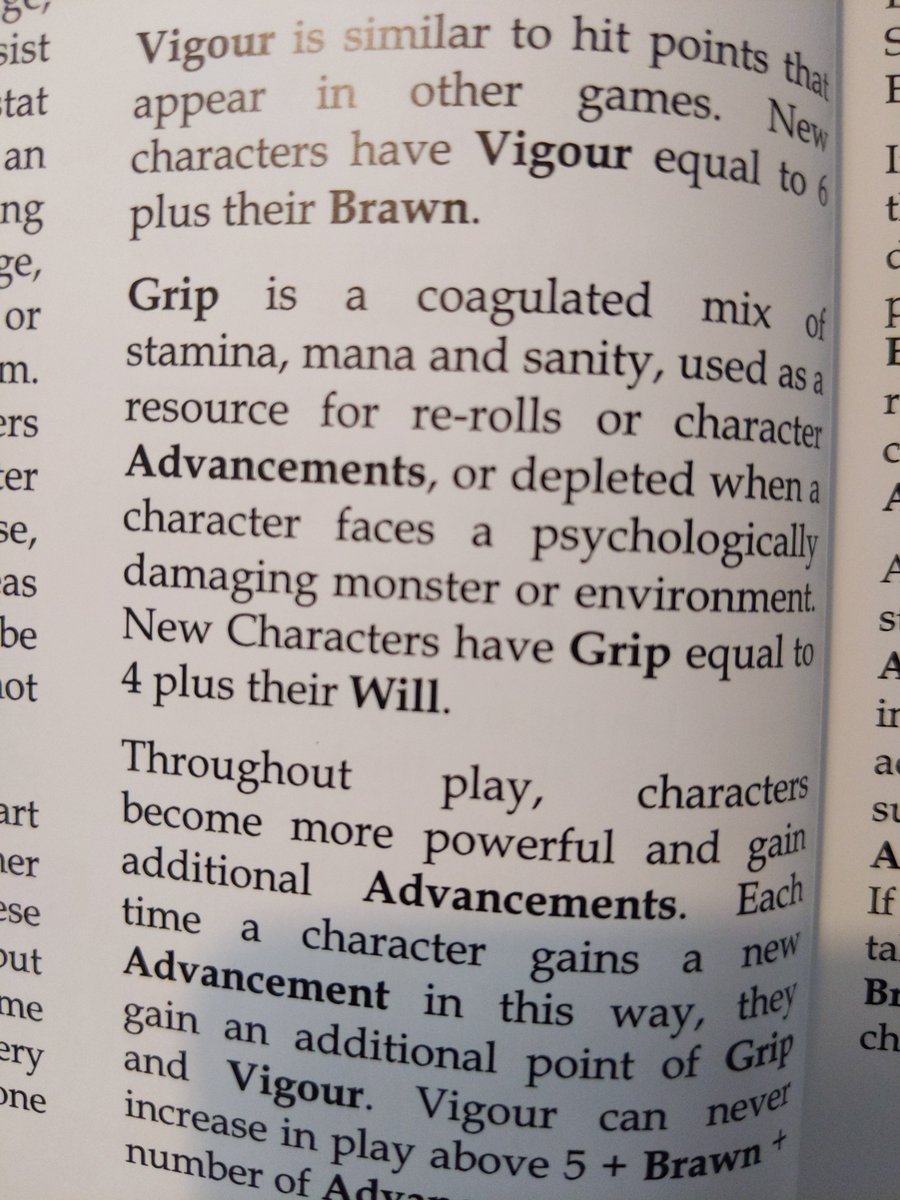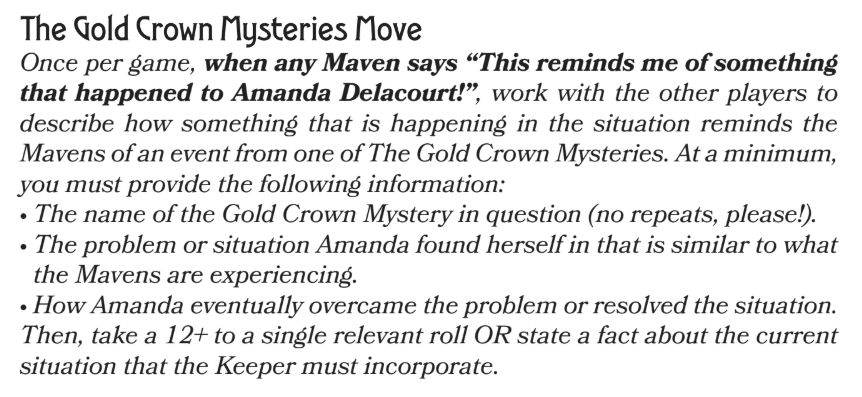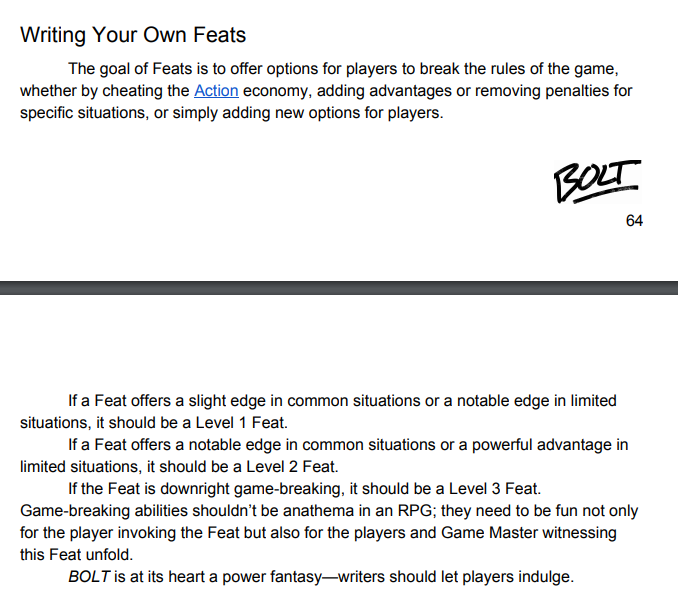I just woke up after dreaming about what was basically be FtL: Faster Than Light, the #ttrpg and now I can& #39;t sleep again so I& #39;m gonna have to write it.
Okay, so thinking about this some more. The game I have in my head isn& #39;t *really* FTL, but it& #39;s close enough that that& #39;s a good touchstone for it.
This thread is going to be me throwing ideas down as I work on it.
This thread is going to be me throwing ideas down as I work on it.
Strip out the ship management parts of FTL, and at its core it& #39;s a pointcrawl in space. And that& #39;s nice and easy to build. We don& #39;t need a new game for that.
But I want to write a game. So let& #39;s do some stuff with it.
But I want to write a game. So let& #39;s do some stuff with it.
I like the idea of a game that can be played as a group, with a GM, or solo as a journaling style game. I have this vague notion that you could have an oracle, with a deck of cards and prompts for each, and build the pointcrawl by forming a small deck of however many cards.
If we have an ultimate goal - deliver the message of the invading force, say - we can call that the Ace of Hearts, and instruct players to split the deck in two, shuffle the Ace into one like, and stack that pile on the bottom.
This is how board games like Legendary Encounters deal with their rising difficulty, and it& #39;s how Galaxy Trucker randomises the voyage each time.
Half of game design is stealing.
Half of game design is stealing.
If you& #39;re playing with a GM it& #39;d be a more traditional experience, but they can use the prompts from the oracle to help build the game. And if you& #39;re flying solo, it& #39;s a straightforward journaling game.
So far, so good.
So far, so good.
I& #39;ll get back to this once I know more about what the game is. I do have a vague idea that your ship/character has a Speed, that encounters reduce your Speed, and when it hits 0 the pursuing force catches up to you.
Right now I& #39;m thinking about combat. Something I absolutely don& #39;t want is the war of attrition "I hit (or shoot, whatever) them, oh I miss, they shoot me, they hit" that happens in so many games, where you just trade blows until someone loses.
Space combat should be a last resort, right? Combat as a fail state. Because if your ship gets a hole blasted in it, you& #39;re fucked. So I want it to feel frantic and desperate.
My favourite combat system recently, that feels scrappy and desperate and dangerous, is Troika!
In Troika! combat is a system of opposed rolls. You both roll every turn, and the person who wins does damage. There& #39;s no missing. Someone gets hit every single round of combat.
In Troika! combat is a system of opposed rolls. You both roll every turn, and the person who wins does damage. There& #39;s no missing. Someone gets hit every single round of combat.
And honestly I& #39;d happily just steal that. But I also like the idea of a system where the GM doesn& #39;t roll dice. I& #39;m really into that recently.
Another system I really like is Best Left Buried. You roll 3d6+Stat. If two of your dice+Stat add up to 8 or more, you deal the remaining die as damage.
In BLB enemies do this as well, but since we& #39;re rolling against a target number here we can tweak it to work like Troika!
In BLB enemies do this as well, but since we& #39;re rolling against a target number here we can tweak it to work like Troika!
So now, rather than just missing if you don& #39;t hit the target number, we can say that the enemy hits instead. Maybe they deal the lowest die+ their stat as damage? That& #39;s something that I can figure out later.
But for now, that& #39;s a combat system in place.
But for now, that& #39;s a combat system in place.
(I know there& #39;s a big school of thought that says that you shouldn& #39;t read other games, or that it shouldn& #39;t be a requirement of design at least, and I do agree with that. But at the same time, if you read a lot of games you don& #39;t need to reinvent the wheel.
You can just grab bits that work and smash other systems together into something new, and that& #39;s a big chunk of the work done for you.)
Okay so I can& #39;t do much more just throwing ideas at twitter really. I think I want ships and pilots to work the same way statistically even if numbers are different? I dunno. I think having a few simple systems is better than overcomplicating things. Rules-lite is my jam recently
Since this is what my brain& #39;s thinking about right now: game balance.
It& #39;s a myth. Throw it out. Write your game, playtest it, fix anything obviously broken and don& #39;t sweat the rest.
It& #39;s a myth. Throw it out. Write your game, playtest it, fix anything obviously broken and don& #39;t sweat the rest.
Right that& #39;s out of my system.
Stats. What are they going to be? I like the Best Left Buried system of three stats at +2/+1/+0. Maybe I want a larger spread, or to introduce some randomness? I don& #39;t know yet.
I know we& #39;ll go straight modifiers and do away with scores entirely.
Stats. What are they going to be? I like the Best Left Buried system of three stats at +2/+1/+0. Maybe I want a larger spread, or to introduce some randomness? I don& #39;t know yet.
I know we& #39;ll go straight modifiers and do away with scores entirely.
MORK BORG does a spread of -3 to +3 over 4 stats and that also works pretty well. It& #39;s a little swingier than BLB but that& #39;s fine. More chaos in the system is good.
Why are Best Left Buried and MORK BORG my touchstones for a space game? Because I& #39;m basically writing an OSR point- and dungeon-crawler, but in space.
Mainly because these are the kinds of games I like, but also because it& #39;s what I know.
Mainly because these are the kinds of games I like, but also because it& #39;s what I know.
Anyway.
What& #39;s the core mechanic? 2d6+Stat with degrees of success, PbTA style, is tried and tested and works well. It& #39;s also not far off the combat resolution mechanic. That& #39;s the same except we add an extra d6 to roll damage at the same time.
What& #39;s the core mechanic? 2d6+Stat with degrees of success, PbTA style, is tried and tested and works well. It& #39;s also not far off the combat resolution mechanic. That& #39;s the same except we add an extra d6 to roll damage at the same time.
I wonder if there& #39;s something in keeping that combat mechanic for non-combat rolls? 3d6+Stat Vs a static number, the leftover d6 has an impact on the result somehow?
I like it, but I don& #39;t know the specifics of it yet and I& #39;ll have to let it percolate for a bit. To be continued.
I like it, but I don& #39;t know the specifics of it yet and I& #39;ll have to let it percolate for a bit. To be continued.
So this has definitely moved away from being FTL the RPG now. You& #39;re not the crew of a single ship - you& #39;re pilots of individual fighters. Less ship management and fucking with systems, more dogfights and blaster cannons, with a pointcrawl framework.
This is all down to what I like, basically. I don& #39;t like survival mechanics and systems management and things like that. Even though I love FTL, I love it in spite of the actual gameplay, which I& #39;ve never fully enjoyed.
And I& #39;m not going to make a game I wouldn& #39;t enjoy playing.
And I& #39;m not going to make a game I wouldn& #39;t enjoy playing.
Right. I& #39;m at a point where I can& #39;t really make any more decisions about how the game worms until I know exactly what the players are going to do in the game. I sort of hate the term "core loop", but that& #39;s what I have to define now. The rest of the design will flow from that.
(Jumping back slightly to say that I& #39;ve just realised that the desire to write a game that works either solo or as a group ABSOFUCKINLUTELY comes from spending yesterday reading the Fighting Fantasy RPG. And yes, I know Ironsworn also does this.)
Okay, so core gameplay. What is this game?
Players take the role of a squadron of fighter pilots fleeing at the head of an invading force. They race across the galaxy back to their home planet to warn against the coming invasion.
Players take the role of a squadron of fighter pilots fleeing at the head of an invading force. They race across the galaxy back to their home planet to warn against the coming invasion.
Movement is abstracted via a pointcrawl system. Each point represents a new encounter - derelict space stations, trading posts, asteroid fields, planets with extraorbital defence mechanisms, alien ships that may be hostile or friendly, scouts from the invaders.
Players have a choice to make - get back fast, burning through resources and making sure the message gets delivered promptly, or be slower, stealthier, and gather more intel - and maybe allies and powerful weapons to help fight back the invaders. But slower is riskier.
(Any semblance of structure this thread had is about to go right out the window because I can feel my brain starting to jump around and make connections between things. Sorry if this gets incoherent - it& #39;s just how I work)
There& #39;s scope here to have different modes of play. There& #39;s the umbrella structure of the pointcrawl, but we can also do some space dungeon delving where players get out of their ship. We can go into sprawling alien megastructures, invade enemy space bases, and shit like that.
This is easier to do in a traditional GMd/guided style of play where one player is building things for the others to explore. Part of the challenge will be building a good toolbox so that solo players can easily generate this stuff on the fly.
Maybe we procedurally generate dungeons, again using cards. We could have different oracles for different styles of dungeon - small space station, giant megastructures, etc - and construct a random deck from the cards that aren& #39;t being used to construct the pointcrawl.
It still uses one standard 52 card deck for the whole game, but we put it to multiple uses.
Jumping back a bit to core mechanics, @wereoctopus just provided this fantastic idea https://twitter.com/wereoctopus/status/1278580661058629632?s=20">https://twitter.com/wereoctop...
One thing that& #39;s bugging me that I need to solve, is how to give players meaningful choice in the pointcrawl if we& #39;re generating it from a deck of cards. I don& #39;t want it to be a game of "turn over a card, see what& #39;s there, move on".
I mean, that& #39;s what it WILL be, but I want at least the illusion of choice, yknow? The old & #39;invisible railroad& #39; thing.
FTL has two levels of map - a large sector map which effectively functions as a level select screen, and then the individual sectors are split into beacons
FTL has two levels of map - a large sector map which effectively functions as a level select screen, and then the individual sectors are split into beacons
On the Sector map, players are told who controls each sector - and this determines the relative difficulty of that sector. So how do we replicate something like this?
I& #39;ve been working under the assumption that the face of the cards will be hidden information, but what if they aren& #39;t? What if we map a controlling power to each suit, and then have the numbers be an indicator of difficulty? Face cards could do something special.
So when you go to jump to a new sector, the GM reveals X amount of cards, and you pick where you want to go.
This leaves us with the problem of generating the content for each sector, but we can deal with that.
This leaves us with the problem of generating the content for each sector, but we can deal with that.
And when I say "we can deal with that" what I mean is "people have been running pointcrawls for years and this is effectively a solved problem".
Okay, back to FTL since that& #39;s my main touchstone here even if I don& #39;t ultimately end up trying to replicate it.
Players move through 8 sectors which each contain about 20 beacons (IIRC). You& #39;re prevented from accessing all the beacons by the advancing enemy forces.
Players move through 8 sectors which each contain about 20 beacons (IIRC). You& #39;re prevented from accessing all the beacons by the advancing enemy forces.
Each sector links to 2 or 3 other sectors. So a full sector map might have, say, 24 nodes on it.
That& #39;s nearly half a deck of cards, which is a little excessive if we want to also use the deck to generate dungeons.
That& #39;s nearly half a deck of cards, which is a little excessive if we want to also use the deck to generate dungeons.
We can partially solve that by discarding the sectors you don& #39;t select at each jump, and using all cards not in the Sector Deck to generate dungeons.
So you& #39;d go to a Sector, do whatever we do there (I haven& #39;t worked that out properly yet), then jump. The GM turns over 2 or 3 cards from the Sector Deck, you pick one, and that& #39;s the best place you go to. The ones you don& #39;t pick, and the Sector you just came from, are discarded.
Dropping this tweet from @wereoctopus here so I don& #39;t forget to come back to it and check out these references https://twitter.com/wereoctopus/status/1278587667865718786?s=20">https://twitter.com/wereoctop...
So that& #39;s the larger structure. And we don& #39;t even need the Ace of Hearts to represent home anymore. Once we run out of cards in the Sector Deck we& #39;ve reached our Home Sector, and the game can have special rules for that to make the endgame feel different
Now to think about how Sectors will actually work, because this is where the Game part of the game actually happens.
Again we& #39;re going to start by trying to model FTL, see what works, and change it to suit our needs.
Again we& #39;re going to start by trying to model FTL, see what works, and change it to suit our needs.
Sectors in FTL are pointcrawls. They have around 20 points, called Beacons. Each point links to 2 or 3 others. The aim is to get from left to right without falling behind the advancing line of enemy forces.
It& #39;s classic risk Vs reward. Each turn the line advances. You can either take the most direct route, staying well ahead of the enemy, or you can try to explore and gather more resources/items/crew, and therefore become more effective.
We can model the advancing line by giving our ships a stat that we can call something like Threat. Moving to new nodes in a Sector increases your Threat, and if it reaches a certain level the enemy forces catch up to you. Events and choices at nodes can reduce your Threat.
This nearly models the distance between different nodes, too. Moving to a node that& #39;s close, or going backwards, increases your Threat more because you put less distance between you and the enemy.
The terminology and the number increasing not decreasing might not be intuitive and might need to change. It may make more sense to have the number drop and the enemy catch you when it hits 0, but that& #39;s a cosmetic thing that& #39;s not important at this stage.
It could be as simple as naming that stat Distance. The further you jump, the higher your Distance. The closer the enemy gets, the lower it is.
Fixed. Good.
Fixed. Good.
This then adds a tactical element to movement and exploration, and allows players to make meaningful choices. It& #39;s also a screw we can turn if players venture into dungeons. It& #39;s a clock that says, "the enemy is getting closer. Do you delve deeper, or go back to your ship?"
It would require some bookkeeping, but we can absolutely build a system whereby if you spend X amount of time stationary on a planet or in a dungeon, your Distance decreases.
And maybe the more time you spend stationary in one place, the more chance there is of the Enemy actually locating you. Maybe they know you exist but not where you are and they& #39;re slowly hunting you, but if they get a bead on your they suddenly speed up.
(There& #39;s such a big part of my brain that& #39;s suddenly screaming SCRAP THIS AND MAKE IT A #WretchedJam GAME INSTEAD)
I said this once already this thread but now I think I actually mean it - I& #39;m at a point where I need to start actually writing the game so I can see where the gaps are and what I need to do. Will add to this thread as I hit new stuff, but it& #39;s going to slow down for a bit now.
Popping back in to make a note that k enjoy games that give players a currency they can spend to do extra stuff or reroll things etc.
See MORK BORG& #39;s Omens, BLB& #39;s Grip, Troika!& #39;s Luck, etc
See MORK BORG& #39;s Omens, BLB& #39;s Grip, Troika!& #39;s Luck, etc
So I& #39;ll probably do something like that in this game. Also I& #39;m leaning science fantasy rather than straight sci-fi, because I want players to be able to unleash mind blasts and explode alien heads with psionics and stuff like that. And that lets me get weird with monsters, too.
For some reason rather than doing any real work on this right now I& #39;m now trying to pin down a name for it. I don& #39;t know why.
For those who are keeping up with this, a question about stats.
It& #39;s going to be modifiers only, and either an array (+2/+1/0/-1) or rolled for with a range from +2 to -2.
Which do you prefer? Or should I just give options for both?
It& #39;s going to be modifiers only, and either an array (+2/+1/0/-1) or rolled for with a range from +2 to -2.
Which do you prefer? Or should I just give options for both?
The other thing I& #39;m working on here is a fairly fundamental one - what abilities do I want characters to have?
The abilities you choose say something about the kind of game you& #39;re making and the kind of things characters are going to be doing.
The abilities you choose say something about the kind of game you& #39;re making and the kind of things characters are going to be doing.
I want an array of 3-4 abilities for player characters AND an array of 3-4 abilities for their ships, though I may just have pre-made ships to choose from rather than having players generate stats for the,
Abilities and currencies in my main touchstone games:
Best Left Buried: Brawn, Wit, Will + Grip
MORK BORG: Agility, Presence, Strength, Toughness + Omens
Troika!: Skill, Stamina + Luck
Fighting Fantasy RPG: Skill, Stamina, Luck
Best Left Buried: Brawn, Wit, Will + Grip
MORK BORG: Agility, Presence, Strength, Toughness + Omens
Troika!: Skill, Stamina + Luck
Fighting Fantasy RPG: Skill, Stamina, Luck
Other relevant games:
Solar Blades & Cosmic Spells: Physique, Agility, Intellect, Willpower
Stars Without Number: Str, Dex, Con, Int, Wis, Cha
I already know I don& #39;t want the Big 6 Ability Scores, so Stars Without Number can get in the as far as reference for this.
Solar Blades & Cosmic Spells: Physique, Agility, Intellect, Willpower
Stars Without Number: Str, Dex, Con, Int, Wis, Cha
I already know I don& #39;t want the Big 6 Ability Scores, so Stars Without Number can get in the as far as reference for this.
I *know* that I want one of my Character stats to be "Weird". That will cover whatever kind of magic/psionics system I come up with, along with anything else that falls under the broad remit of Weird. I think having a stat like that says something about the tone of the game.
I also know that I want that Distance clock/currency I talked about earlier, but that seems like a stat that affects the entire group and not just one character.
I& #39;m also figuring out what my currency stat will be. Luck is an obvious one, but it also feels generic at this point. Lots of games use Luck. Under The Floorboards uses Luck, ffs. It doesn& #39;t say anything about the game other than "we wanted to let you reroll dice".
MORK BORG and BLB both have s similar mechanic. MORK uses Omens, which recharge each day.
BLB uses Grip, which serves multiple purposes and - crucially - is very difficult to recover.
BLB uses Grip, which serves multiple purposes and - crucially - is very difficult to recover.
I might try and settle somewhere between the two, and maybe my Weird stat can serve this purpose. You can spend it to use psionic abilities - but you can also use it as a source of luck. You& #39;re basically exerting mental/magical energy to warp reality to your liking.
And the more you do this, the harder and less effective it gets to do. That lets me put magic into this system but keep it under control. As far as I& #39;m concerned, a low level of magic that you barely understand and can& #39;t really contain is way more fun than spell levels and Wish.
Let& #39;s go back to the other abilities, and let& #39;s assume we& #39;re using just 3.
The general spread is this: Physical, Mental, Social/Personality, right?
The general spread is this: Physical, Mental, Social/Personality, right?
There& #39;s a LOT of discussion about Intelligence as an inherently ableist stat, and while I& #39;m not an expert on the topic and don& #39;t know the nuances of the argument I largely agree with the thrust of the argument.
We& #39;ll be avoiding Int, and anything that mechanises Smart as Good.
We& #39;ll be avoiding Int, and anything that mechanises Smart as Good.
My immediate thought for a physical stat was Brute, because that says something about how physicality is used in the game, but Best Left Buried uses Brute and I don& #39;t want to just *steal* from it.
Fuck you, Zach, for getting to that first <3
Fuck you, Zach, for getting to that first <3
I kind of like the saving throws from 3rd Edition D&D as an array of abilities, if I& #39;m being honest - Fortitude, Reflex, Willpower. There& #39;s no real mental stat there, but I& #39;m okay with that.
(More coffee needed)
Typing the material from this thread up into something that resembles a design document is DIFFICULT. It& #39;s like trying to organise a bowl of spaghetti into some semblance of order.
So, back to stats. I& #39;m working with this array at the moment and I kind of like it - I just need to make sure I define them properly. Especially & #39;Edge& #39; - it& #39;s not a particularly descriptive word, but it fits the tone I want to strike.
We& #39;re making progress now
Working on defining the 2 levels of play - i.e. what we talked about earlier, where we have a pointcrawl between Sectors that zooms in to a pointcrawl between Beacons.
I& #39;ll call them Hyperjump and Systems, for now, and this is one of those points where lore reinforces mechanics.
I& #39;ll call them Hyperjump and Systems, for now, and this is one of those points where lore reinforces mechanics.
Players start at the edge of the galaxy and have to get home over a series of jumps between systems. In between those jumps, they explore the system and navigate between different points of interest. This is where the adventure and the bulk of the gameplay occurs.
But players are on the clock, so what& #39;s the stop them just making a series of jumps, not doing any exploring, and getting home?
This is where the fiction comes in.
This is where the fiction comes in.
It& #39;s no secret that one of my favourite vidya games is Elite: Dangerous. In that game, your hyperjump makes use of the massive gravity wells of stars. When you jump into a new system, you jump next to the biggest star.
We& #39;re going to use that.
We& #39;re going to use that.
In this game, you jump next to stars - but the gravity is so immense that you can& #39;t just jump away from them once your warp drive (or whatever) has spooled up again. You have to get far enough away so that you can properly escape its gravity.
It& #39;s soft science, but I don& #39;t care. I& #39;ve got psionics in this game. I don& #39;t really care about the science. What I care about is having a justification for why you spend time exploring the systems you jump to.
So you jump in, crawl away from the star and have adventures as you do that, and once you& #39;re far enough away - basically on the other end of the solar system - you can make your next jump.
That works, right?
That works, right?
For some reason I& #39;m thinking about Distance again (I know, this thread is all over the place, I& #39;m sorry).
I want physical counters for Distance. Especially when players are doing something outside their ships, like exploring a megastructure.
I want physical counters for Distance. Especially when players are doing something outside their ships, like exploring a megastructure.
I want that physical, visual reminder that they& #39;re being chased. I want them to remove Distance counters to do cool stuff, and for the GM to be able to remove them too. Do we rest and push on into the dungeon? It& #39;s going to cost Distance, and we only have 3 left. What do we do?
I wonder if Distance should reset each time you hyperjump? That& #39;s effectively what happens in FTL. It basically becomes a timer for how long you can spend in each system. Hmmm.
Another difference here is that I don& #39;t really want a "game over" state as a default.
Another difference here is that I don& #39;t really want a "game over" state as a default.
So what happens if you let the Ancient Enemy get too close? Maybe we change how the systems act, and the goal becomes to get ahead of them again?
But at this point I& #39;m thinking in terms of long-term campaign play, right? I should focus on getting the core gameplay down first, make sure it works as intended. Then I can worry about longevity and think about if that& #39;s even something I want to design for.
Designing for campaign play introduces a while host of other stuff to consider. Is XP a thing? How do we deal with it? Do characters improve, and in what ways? Do enemies have to scale to level? I& #39;m not ready to answer those questions yet, though they& #39;re good to bear in mind.
I think I& #39;m done for the day. I& #39;ve been working on this off and on for nearly 12 hours now and it& #39;s time to give my brain and eyes a break. Back at it tomorrow and we& #39;ll see how much more I can get done!
Just a note to myself to ensure I make this game SUPER GAY
Okay I& #39;m back at this. Not sure how much I& #39;ll get done today? I& #39;m going to start off by reading a couple of other games that people have mentioned - mainly Solar Blades & Cosmic Spells by @diogo_oldskull. I& #39;ve ordered it in print because it looks AMAZING but for today PDF will do
I started trying to pull this thread into some semblance of an order in a GDoc yesterday. Once I& #39;ve read SB&CS I think I& #39;m going to start looking at ways to mechanise and reward play-driven worldbuilding and giving them ways to really shape the game.
We& #39;re completely out of genre here, but I really love @jasoncordova6& #39;s Brindlewood Bay - in particular the Gold Crown Mysteries Move and the Occult Move, which give players real agency in the fiction of the game AND let them develop new mechanics.
Space Game probably won& #39;t be PbTA? I& #39;m not sure yet, and I might not be writing moves. But this is a good reference point for me.
The other thing I& #39;ll be drawing from is @BoltRPG - in particular the way the game gives you explicit permission to let players write new Feats, and the way it handles Knowledge skills.
Again, we& #39;re letting players directly affect both the fiction and the mechanics of the game.
Again, we& #39;re letting players directly affect both the fiction and the mechanics of the game.
Doing that mental jumping around thing again.
Weapons. Equipment. Armour. All that shit.
We don& #39;t need it. I don& #39;t want it. I don& #39;t even think I& #39;m going to reduce it to 6 broad weapon types like Best Left Buried does.
Weapons. Equipment. Armour. All that shit.
We don& #39;t need it. I don& #39;t want it. I don& #39;t even think I& #39;m going to reduce it to 6 broad weapon types like Best Left Buried does.
I& #39;m obviously miles away from thinking about this properly right now, but I& #39;ve already established that the 3rd die roll in an attack deals damage. I think I& #39;ll let players decide whether their character focuses on Bulk, Edge, or Will, and when they attack using that stat...
...we& #39;ll let them deal an extra amount of damage by default. Maybe we& #39;ll let them reroll one or two dice, or add a die to their pool, or something. And maybe that will have limited uses per day/rest/whatever we decide on.
Still vague ideas at this point, obviously.
Still vague ideas at this point, obviously.
But I hate weapon tables and don& #39;t want them.
The obvious extension of this thought process is - do we have classes in this game? How do we differentiate characters?
Again I& #39;m not at that stage yet. I do know that wherever I settle, I& #39;ll only build enough initially for me to playtest it.
Again I& #39;m not at that stage yet. I do know that wherever I settle, I& #39;ll only build enough initially for me to playtest it.
So if I *do* decide on Classes, for example, I& #39;ll probably design (for the sake of argument) a Melee Fighter and a Psion, and run games using just those two archetypes to see if it all works.
But again. I& #39;m getting ahead of myself.
But again. I& #39;m getting ahead of myself.
More jumping around.
I& #39;m thinking about health, and hit points, and stuff like that. I don& #39;t necessarily want character death to be a thing in the game, unless players want it. And I think the easiest way to signify that is to do away with the idea of Hit Points as a concept.
I& #39;m thinking about health, and hit points, and stuff like that. I don& #39;t necessarily want character death to be a thing in the game, unless players want it. And I think the easiest way to signify that is to do away with the idea of Hit Points as a concept.
My initial idea is that maybe you have a Harm level, and that each point of Harm you accrue has negative effects on your character.
As you get into fights and get hurt, you gain damage. If you cumulative damage equals X+your Level, you gain a point of Harm.
As you get into fights and get hurt, you gain damage. If you cumulative damage equals X+your Level, you gain a point of Harm.
Damage can be reduced by resting and healing. Harm can& #39;t.
This also adds more time pressure on the game. The characters are trying to get across the galaxy FAST, balancing speed with collecting resources, information, and allies. Now they have to balance their Harm as well.
This also adds more time pressure on the game. The characters are trying to get across the galaxy FAST, balancing speed with collecting resources, information, and allies. Now they have to balance their Harm as well.
It might not stay, and if it does the design will change, but I like this as a concept and so for now it& #39;s going into the game.
I see Harm as falling somewhere between the Stress track in Darkest Dungeon and Exhaustion in 5e - except both of them explicitly kill characters when you gain too much.
I& #39;m not sure what the end goal of Harm will be yet. That& #39;ll come out in the wash.
I& #39;m not sure what the end goal of Harm will be yet. That& #39;ll come out in the wash.
Honestly this will be the biggest game I& #39;ve written on my own so I& #39;ll probably be running a public playtest of some kind once it& #39;s in anything resembling a playable state. Even if that& #39;s just throwing out a GDoc and saying "let me know if you play it".
Okay so I guess I& #39;m committed to maintaining this thread now?
Doing some more work today but I don& #39;t quite know what I& #39;ll focus on yet. Here& #39;s music to write a space game to: https://open.spotify.com/album/48ZNEhROC1AIS1WKEiSffQ?si=3CfvAp9LQUarGd2I_OSGIg">https://open.spotify.com/album/48Z...
Doing some more work today but I don& #39;t quite know what I& #39;ll focus on yet. Here& #39;s music to write a space game to: https://open.spotify.com/album/48ZNEhROC1AIS1WKEiSffQ?si=3CfvAp9LQUarGd2I_OSGIg">https://open.spotify.com/album/48Z...

 Read on Twitter
Read on Twitter